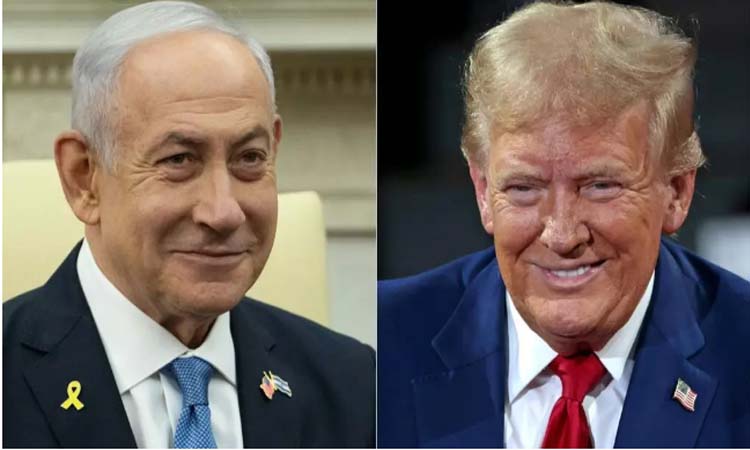News Flash
News Flash

WASHINGTON, Feb 4, 2025 (BSS/AFP) - Benjamin Netanyahu and Donald Trump will discuss the future of the Gaza ceasefire Tuesday as the Israeli prime minister becomes the first foreign leader to visit the White House since the US president's return to power.
Netanyahu is in Washington for talks with the new Trump administration on a second, longer-term phase of Israel's fragile truce with the Palestinian militant group Hamas, which has not yet been finalized.
Trump has meanwhile repeatedly touted a plan to "clean out" Gaza, calling for Palestinians to move to neighboring countries such as Egypt or Jordan, despite all those parties strongly rejecting his proposal.
Before leaving for Washington, Netanyahu said that Israel's wars with Hamas in Gaza, Hezbollah in Lebanon and its confrontations with Iran had "redrawn the map" in the Middle East.
"But I believe that working closely with President Trump we can redraw it even further, and for the better," Netanyahu said.
The White House meeting promises to be a crucial one for a region shattered by war since Hamas's deadly October 7, 2023 attacks on Israel.
Netanyahu hailed the fact that he would be the first foreign leader to meet Trump since his January 20 inauguration as "testimony to the strength of the Israeli-American alliance."
The Israeli premier had tense relations with Trump's predecessor Joe Biden over the growing death toll in Gaza, despite Biden's steadfast maintenance of US military aid.
But Trump, who has claimed credit for sealing the ceasefire after 15 months of war and prides himself on his dealmaking ability, will be pushing Netanyahu to stick to the agreement.
He is also expected to lean on Netanyahu to accept a deal to normalize relations with Saudi Arabia, something he tried to do in his first term.
- 'No guarantees' -
Trump said Sunday that talks with Israel and other Middle Eastern countries were "progressing" -- but then warned less than 24 hours later that there that were "no guarantees that the peace is going to hold."
Trump's Middle East envoy Steve Witkoff -- who met Netanyahu on Monday over terms for the second phase of the Gaza truce -- said however that he was "certainly hopeful" that the truce would stick.
Hamas officials have said they were ready to begin talks on the details of the second phase, which is expected to cover the release of the remaining captives and could lead to a more permanent end to the war.
But Trump's sudden floating of a plan to move people out of Gaza -- which he describes as a "demolition site" -- has added further uncertainty to an already tense and difficult situation.
Trump said the plan could be temporary or permanent, but the mass displacement of civilians from Gaza was strongly rejected by Egypt, Jordan, the Palestinians, and ceasefire mediator Qatar.
Under the Gaza ceasefire's 42-day first phase, Hamas is to free 33 hostages in staggered releases in exchange for around 1,900 Palestinians held in Israeli jails.
Four hostage-prisoner exchanges have already taken place, and the truce has led to a surge of food, fuel, medical and other aid into rubble-strewn Gaza, as well as allowing displaced Gazans to return to the territory's north.
Hamas's October 2023 attack resulted in the deaths of 1,210 people, mostly civilians, according to an AFP tally based on official Israeli figures.
Israel's retaliatory response has killed at least 47,498 people in Gaza, the majority civilians, according to the Hamas-run territory's health ministry.
Israel has meanwhile turned its focus to the occupied West Bank and an operation it says is aimed at rooting out extremism that has killed dozens.